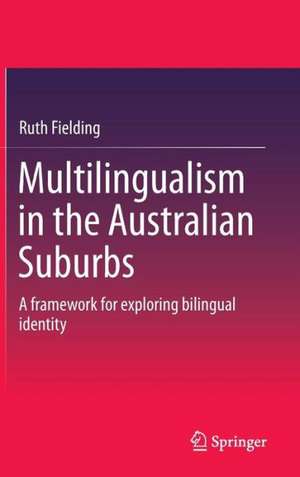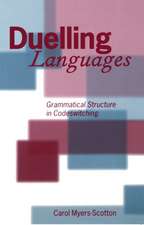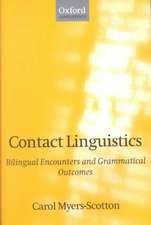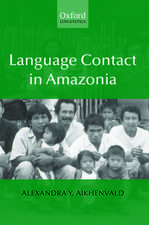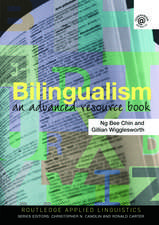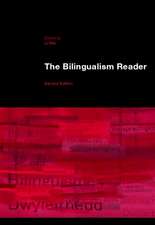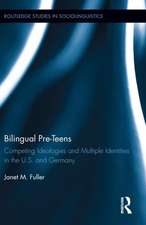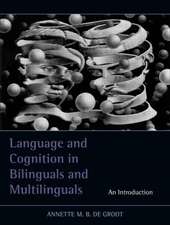Multilingualism in the Australian Suburbs: A framework for exploring bilingual identity
Autor Ruth Fieldingen Limba Engleză Hardback – 8 mai 2015
| Toate formatele și edițiile | Preț | Express |
|---|---|---|
| Paperback (1) | 364.20 lei 38-44 zile | |
| Springer Nature Singapore – 23 oct 2016 | 364.20 lei 38-44 zile | |
| Hardback (1) | 394.12 lei 6-8 săpt. | |
| Springer Nature Singapore – 8 mai 2015 | 394.12 lei 6-8 săpt. |
Preț: 394.12 lei
Nou
Puncte Express: 591
Preț estimativ în valută:
75.41€ • 78.74$ • 62.27£
75.41€ • 78.74$ • 62.27£
Carte tipărită la comandă
Livrare economică 15-29 aprilie
Preluare comenzi: 021 569.72.76
Specificații
ISBN-13: 9789812874528
ISBN-10: 9812874526
Pagini: 180
Ilustrații: XV, 230 p. 25 illus., 11 illus. in color.
Dimensiuni: 155 x 235 x 20 mm
Greutate: 0.56 kg
Ediția:2015
Editura: Springer Nature Singapore
Colecția Springer
Locul publicării:Singapore, Singapore
ISBN-10: 9812874526
Pagini: 180
Ilustrații: XV, 230 p. 25 illus., 11 illus. in color.
Dimensiuni: 155 x 235 x 20 mm
Greutate: 0.56 kg
Ediția:2015
Editura: Springer Nature Singapore
Colecția Springer
Locul publicării:Singapore, Singapore
Public țintă
ResearchCuprins
Chapter 1 Introduction.- Chapter 2 Bilingual Identity - being and becoming bilingual.- Chapter 3 Context, data collection and analysis.- Chapter 4 Children's Language Use.- Chapter 5 Attitudes to Language.- Chapter 6 Attitudes to bilingualism.- Chapter 7 The Bilingual School Program's contribution to bilingual identity development.- Chapter 8 Conclusions and Implications for education bilingual children in today's world.
Notă biografică
Ruth Fielding is Assistant Professor of TESOL and Foreign Language Teaching at the University of Canberra. She is the Course Convener for the Master of Arts in TESOL and Foreign Language Teaching program. She previously worked for over eight years as a Lecturer in Languages Education and TESOL at the University of Sydney where she coordinated the single method Languages Curriculum units within the pre-service teacher education courses and a unit within the MEd TESOL program. Ruth began her career as a secondary teacher of French and German. She completed her PhD in 2009 with a thesis exploring bilingual identity. Ruth's current research focuses upon four bilingual programs introduced in NSW, and explores the pedagogies in these contexts and the assessment of language and content achievement in these programs. Her postdoctoral research has included: an exploration of the implementation of four new bilingual programs; an examination of language and literacy programs for recently arrived school students in Australia; exploration of the use of a variation to the IRE turn as a potential intercultural pedagogical tool; and exploration of the transition of language learners from school into university.
Ruth has been involved with languages education through the national and State language teacher associations. She co-convened the AFMLTA's 17th Conference in Sydney in 2009. She served as Secretary of the national language teacher association – AFMLTA from 2012 -2013 and is an executive committee member of the State language teacher association - MLTA NSW. Ruth teaches and researches in the areas of primary and secondary languages education, language teacher education, bilingualism and bilingual identity.
Ruth has been involved with languages education through the national and State language teacher associations. She co-convened the AFMLTA's 17th Conference in Sydney in 2009. She served as Secretary of the national language teacher association – AFMLTA from 2012 -2013 and is an executive committee member of the State language teacher association - MLTA NSW. Ruth teaches and researches in the areas of primary and secondary languages education, language teacher education, bilingualism and bilingual identity.
Textul de pe ultima copertă
This book introduces a framework for examining bilingual identity and presents the cases of seven individual children from a study of young students’ bilingual identities in an Australian primary school. The new Bilingual Identity Negotiation Framework brings together three elements that influence bilingual identity development – sociocultural connection, investment and interaction. The cases comprise individual stories about seven young, bilingual students and are complemented by some more general investigations of bilingual identity from a whole class of students at the school. The framework is explained and supported using the students’ stories and offers readers a new concept for examining and thinking about bilingual identity. This book builds upon past and current theories of identity and bilingualism and expands on these to identify three interlinking elements within bilingual identity. The book highlights the need for greater dialogue between different sectors of research and education relating to languages and bilingualism. It adds to the increasing call for collaborative work from the different fields interested in language learning and teaching such as TESOL, bilingualism, and language education. Through the development of the framework and the students’ stories in this study, this book shows how multilingual children in one school in Australia developed their identities in association with their home and school languages. This provides readers with a model for examining bilingual identity in their own contexts, or a theoretical construct to consider in their thinking on bilingualism, language and identity.
Caracteristici
Presents a new framework to understand bilingual identity Provides key insights into childrens' multilingual skills development Enhances understanding of how language learners from diverse backgrounds develop confidence in bilingual programs Advocates collaborative work between researchers in different fields and teachers in different multilingual contexts to lead to more inclusive education Includes supplementary material: sn.pub/extras
